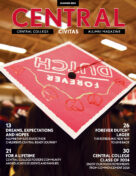Mollie Ibbotson ’05
Major: Business Management
Current position: Client Service Consultant at Wells Fargo Home Mortgage

As a senior in college, I knew that a degree in business would be a great foundation for a future doing pretty much anything. I’ve always been interested in companies that were socially responsible and had strong ethics. One day, in between classes, I remember gathering all my socially responsible products together and researching the companies online for job openings. After an afternoon of getting nowhere, I set up a meeting with Cheri Doane, who handed me a list of “alternatives to the real world,” which included Peace Corps. I applied and got my first gig as a community development volunteer in Thailand.
After I came back, I knew I wanted to continue to build on my experiences in Thailand. After working as an AmeriCorps volunteer in the non-profit and government sectors, it was time to try the corporate route. I saved this one for last because I didn’t know what I wanted do.
Q: I’ve just decided that it is time to change careers. What’s my first step?
A: The first step is to get a feel for what is out there. I spent a lot of time working through my current networks and meeting with people who had interesting careers. I also worked with a career coach on developing a results-based resume, interviewing skills and networking.
Your next job probably won’t be your forever job, so really focus on positions that will give you a broad understanding of the industry or a specific skill that will set you up for the next step. In my case, I started out as an underwriter but now work in community outreach and relations, which I absolutely love. My Peace Corps experience helped me get my current job, but I learned about the financial industry by first working as an underwriter for a year and a half.
Q: How do I use experience from a previous—and possibly unrelated—position to make myself marketable in my new search?
A: Anytime you switch to a new job, the challenge is to present your previous experience in a way that showcases the value you will add to your future employer. Creating a results-based resume is extremely helpful, because it doesn’t require your future employer to know everything about your previous experience to see your value.
Look through the job description for required skills, and go into your interview with specific examples of how you’ve used those skills in previous experience.
Q: Should I resign my current position to look for a new job? If not, how do I balance work and a job search?
A: If you can balance both, you are way ahead of the game. If you resign or are laid off, continue to structure your days as if you were employed by scheduling networking appointments and time for job searching follow up. Try to keep busy the entire ‘work day’ so that you’re ready to jump in when the right opportunity presents itself.












To encourage serious, intellectual discourse on Civitas, please include your first and last name when commenting. Anonymous comments will be removed.
Marnie Stein
|
7:56 am on December 11, 2011
What kind of career coach did you use? Was it an individual or a company?